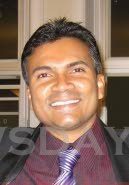Criminologist queries UNC on terrorists, SOE

CRIMINOLOGIST Dr Randy Seepersad on Tuesday was not convinced of the UNC's proposals to curb the country's high murder rate by enacting a state of emergency (SOE) and by deeming violent armed criminals to be terrorists who would be subject to harsher penalties under the law than they now face.
Another commentator speaking anonymously likewise did not think the two measures would get off the ground.
At a UNC crime consultation at the La Joya Complex in St Joseph on Monday, Opposition Leader Kamla Persad-Bissessar supported political scientist Dr Indira Rampersad's calls for an SOE, while former police commissioner, National Transformation Aliance (NTA) head Gary Griffith said heavily armed criminals who pose public safety threat must be likened to terrorists.
Griffith said, "If a person has a reason to commit unlawful violence and intimidation, especially to citizens, that person can and should be deemed a terrorist."
However, under the Anti-Terrorism Act 2005 a law court must cross three hurdles to convict a suspect of a terrorist act.
Firstly, it must cause or be likely to cause "loss of human life or serious bodily harm; damage to property; or prejudice to national security or disruption of public safety." Secondly, its aim must be "to compel a government or an international organisation to do or refrain from doing any act; or intimidate the public or a section of the public." Thirdly, it must be done "for the purpose of advancing a political, ideological or a religious cause."
Asked about these three hurdles, Griffith said the Anti-Terrorism Act must be tweaked, especially to get rid of provision three. He said the fact of a criminal possessing a firearm which can shoot 35 bullets in three seconds should be enough to liken the perpetrator to a terrorist. Acts by such armed criminals are enough to destabilise a country and create a massive fear, he related, and so must be likened to terrorism.
Griffith lamented cases under the current law where criminals were held with firearms, only to receive bail the next day. He preferred the Anti-Terrorism Act for its 25 year jail term, which also imposed liability on anyone giving State contracts to individuals.
Another commentator speaking anonymously to Newsday thought Griffith's call to deem criminals "terrorists" was "an interesting proposal."
He said,"You would have to amend the law, with a special majority. But it won't happen."
The source said the 2011 SOE under the People's Partnership had been "an absolute failure." He said an SOE requires a "huge level of trust."
Seepersad queried the UNC's proposals to have an SOE and to deem criminals to be terrorists.
He told Newsday, "Terrorism is something that is very different from the kind of street-level violence and criminality we have in TT. It is very different in terms of the nature, context and antecedence.
"Ideology and radicalisation were key components of terrorism but not crime," he said.
"What drives a terrorist is very different from what drives a street-level criminal." The latter is driven by profit, and secondly by protection and gang rivalry."
Seepersad viewed Griffith's remarks as largely political rhetoric. He said however you named a certain criminal act, the police still had to seek evidence that would stand up in court. Seepersad then urged a solution-oriented approach, involving factors like employment, family life and support services.
He lamented that economic deprivation and joblessness meant life was becoming increasing difficult for many individuals.
"A state of emergency is not a solution to crime," Seepersad said. He said on one hand a SOE reduced the opportunities for crime to occur. However, he said during a SOE domestic violence and sexual offences often increased as victims live with perpetrators, as seen after the 2011 lock down in figures listed in 2012.
Seepersad said the proposed SOE does not deal with factors such as the police's low detection rate, corruption, and a backlog at the Forensic Sciences Centre.
Replying to Griffith's call for measures to put a lid on crime, he said under the Cure Violence Model local "violence interrupters" in each community detect quarrels and mediate them before violence erupts. He said in 2014-2017 this model had seen a 36 per cent drop in murder in East Port of Spain, compared to a 16 per cent rise nationwide, using this model. He urged more training, funding and technology for the police to increase their detection rate.

Comments
"Criminologist queries UNC on terrorists, SOE"